New Jersey
 Entered Union 18 December 1787
Entered Union 18 December 1787
Area 8,720 square miles (rank 47th)
Population 8,638,400 (2003 estimate; rank 10th)
Largest city Newark [population (2003): 277,900]
Nickname Garden State
2004 Presidential Vote Kerry over Bush (53-46%)
Congressional Delegation 2 Democratic Senators; 13 Representatives (7 Democrats, 6 Republicans)
Let everyone hear me clearly. I will not let false attacks go unanswered. I intend to play fair, but I won't hesitate to play tough. — Jon Corzine, 24 June 2005
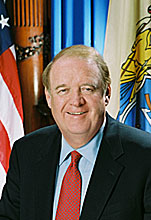 Richard Codey (D), the acting governor, took office in November 2004 after James McGreevey resigned under a cloud of scandal following revelations that he had had an affair with a male former aide. Despite his high popularity, Codey did not run for re-election in November 2005, and he also withdrew himself in late November from consideration to be the replacement for Jon Corzine in the Senate.
Richard Codey (D), the acting governor, took office in November 2004 after James McGreevey resigned under a cloud of scandal following revelations that he had had an affair with a male former aide. Despite his high popularity, Codey did not run for re-election in November 2005, and he also withdrew himself in late November from consideration to be the replacement for Jon Corzine in the Senate.
The rivals in the gubernatorial contest were Jon Corzine (D) and Doug Forrester (R). Corzine, had been New Jersey's senior senator since 2000 (and waged what was at the time the most expensive campaign in U.S. history to gain the office). Corzine was until 1999 the chairman of Goldman Sachs, but was forced out of the company in 1999 by his own partners for steamrolling over their objections to his plan to take the partnership public in order to bail out a capital management fund.
Forrester, director of the state pensions office under Governor Thomas Kean from 1984 to 1990 and mayor of West Windsor Township from 1981 to 1982, was most recently the co-founder of BeneCard Services, a firm that manages prescription benefits for school boards and local governments. Unusually for the Republican Party, Forrester was a pro-choice candidate (as was Corzine), which in part allowed his margin of victory in the Republican primary over prominent challengers like Bret Schundler, the ultraconservative former mayor of Jersey City (whom McGreevey defeated in the 2001 governor's race), but severely hurt his chances of winning votes from New Jersey's conservative voters in the general election.
In 2000, Corzine spent $63 million of his fortune to win the Senate seat, running against New Jersey 7th District Congressman Bob Franks (R) after a bitter primary fight against former Governor Jim Florio. In the end, Corzine won the seat by only 50-47%, unusual for a Democrat in New Jersey. In 2002, Forrester ran against former senator Robert Torricelli, who quit abruptly in the midst of the campaign amid ethics questions and was replaced by Frank Lautenberg. Lautenberg beat Forrester 54-44% and is now the state's junior senator. (Lautenberg was previously senator from 1982 to 2000, when he prematurely announced his retirement. Lautenberg is now 81 years old.)
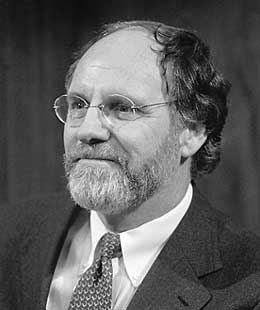

The Corzine-Forrester matchup was unusually mud-slinging and vindictive and culminated with Forrester's campaign broadcasting a TV spot in which Corzine's ex-wife was quoted as saying that Corzine would "let New Jersey down." Corzine's campaign ran a manipulative advertisement featuring a 19-year-old quadriplegic who lambasted Forrester for not supporting stem cell research. There were also under-the-radar rumors allegedly circulated by both Corzine and Forrester's campaigns that each opposition candidate had had extramarital affairs or liaisons with a younger female aide, rumors which were shot down by both men as sleaze-mongering. Corzine was widely criticized late in the campaign for a mortgage loan he made in 2002 to a woman he was dating who also happened to be the head of the state's largest public workers' union local. Ultimately, however, Corzine won handily all over the state, including in heavily suburban Bergen County, a traditional election-year bellwether that has often voted reliably Republican in the past, including in 2000, when the county chose Franks over Corzine by 51-49%. This year, Corzine beat Forrester 55-42% in Bergen County.
On 9 December 2005, in a not-unexpected move, Corzine named Robert Menendez, the third-highest ranking Democrat in the House of Representatives, to fill out the remaining year of his Senate term. Menendez will likely run in 2006 for a full six-year term against Republican State Senator Thomas Kean Jr., the son of the popular former governor. Despite being the favorite to run in 2006, Menendez may still have to face opponents in the Democratic primary. Menendez's House seat is expected to remain empty until November 2006. As of December 2005, two politicians had already expressed interest in running for Menendez's House seat: Joseph Vas, the mayor of Perth Amboy, and Albio Sires, the mayor of West New York.
Virginia
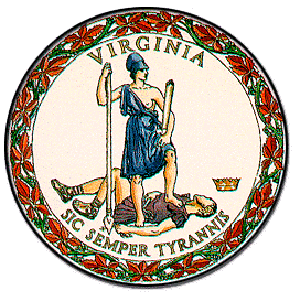
Entered Union 25 June 1788
Area 42,775 square miles (rank 35th)
Population 7,386,300 (2003 estimate; rank 12th)
Largest city Virginia Beach [population (2003): 439,500]
Nickname Old Dominion
2004 Presidential Vote Bush over Kerry (54-46%)
Congressional Delegation 2 Republican Senators; 11 Representatives (8 Republicans, 3 Democrats)
Tim Kaine says that Adolf Hitler doesn't qualify for the death penalty. — From a controversial TV spot broadcast by the Jerry Kilgore campaign starting on 11 October 2005
The Constitution of the Commonwealth of Virginia (Article V, Section 1) limits its governors to one 4-year term, making Virginia the only state in the Union that still has this requirement in force. 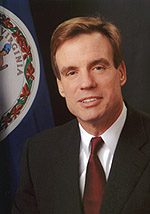 (Mills Godwin, who was governor from 1966-1970 and 1974-1978, was the only governor in Virginia history to serve more than one term, the first term as a Democrat and the second as a Republican.) Thus, although Mark Warner (D), Virginia's outgoing governor, was highly popular and would likely have been re-elected in a landslide if he had been allowed by law to run, the 2005 contest came down to two men who were not popular enough to make much headway against one another in the polls through the course of the campaign. (Mills Godwin, who was governor from 1966-1970 and 1974-1978, was the only governor in Virginia history to serve more than one term, the first term as a Democrat and the second as a Republican.) Thus, although Mark Warner (D), Virginia's outgoing governor, was highly popular and would likely have been re-elected in a landslide if he had been allowed by law to run, the 2005 contest came down to two men who were not popular enough to make much headway against one another in the polls through the course of the campaign.
Warner, the former managing director of Columbia Capitol Group, a telecommunications and information technology venture capital fund, ran Douglas Wilder's successful gubernatorial race against former state attorney general Marshall Coleman in 1989 (Wilder was the first African-American governor elected to office in U.S. history). Warner ran in 1996 against incumbent senior Republican Senator John Warner (no relation) and lost 52-47%. 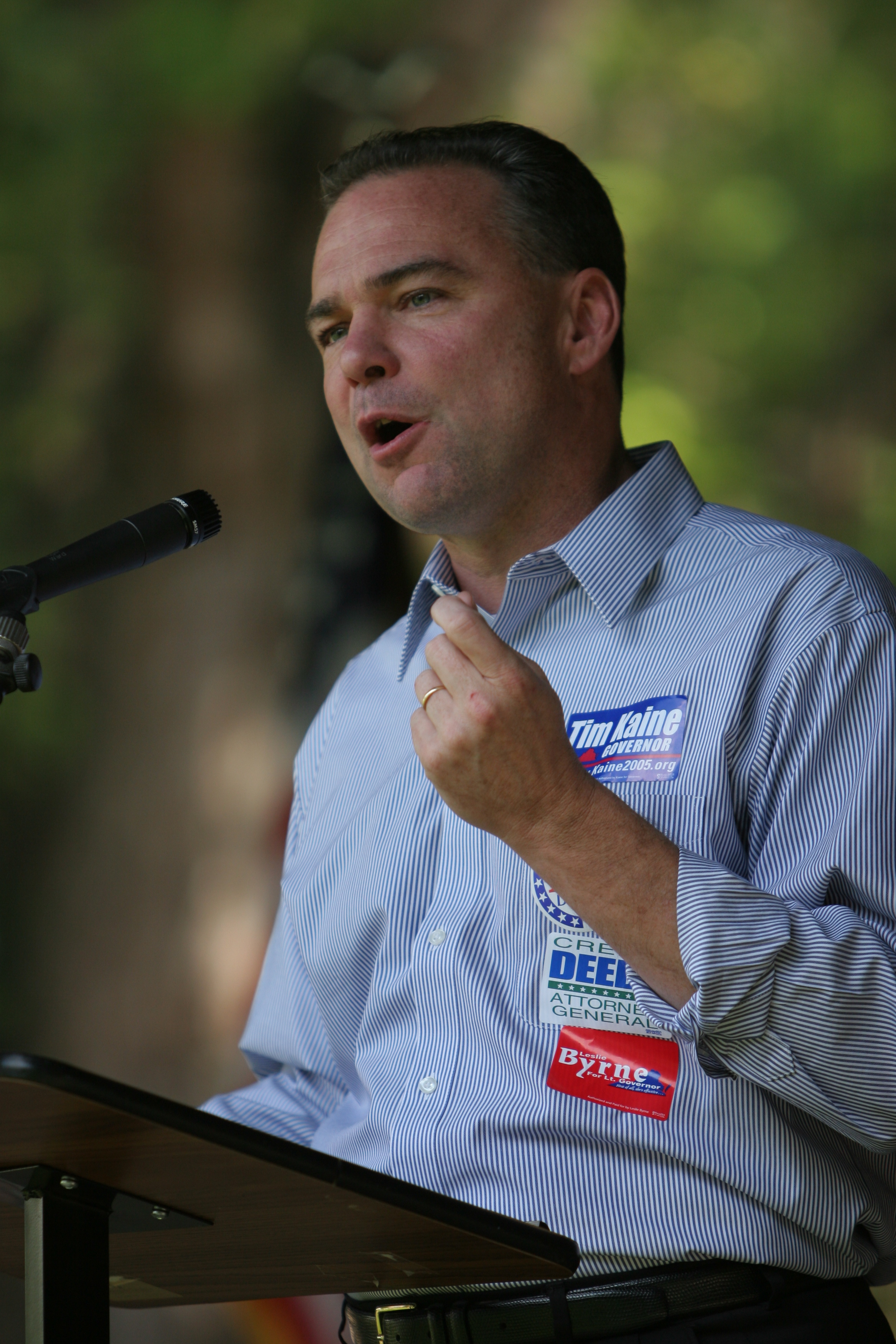  In 2001, Warner ran against state attorney general Mark Earley for the governor's office, this time winning 52-47%. In 2001, Warner ran against state attorney general Mark Earley for the governor's office, this time winning 52-47%.
The two men running for the governor's office in 2005 were Timothy Kaine (D), the former mayor of Richmond (1998-2001) and the lieutenant governor under Warner, and Jerry Kilgore (R), the former state attorney general (2002-2005). The dynamic of the race was complicated by the entry of Russell Potts, a Republican state senator (representing the 27th District, which includes all of Clarke and Frederick Counties and part of Loudoun County) for the past 14 years who ran for governor as an independent and who has notably been a thorn in the side of state conservatives during his time in the state legislature by taking moderate positions on abortion and educational issues. All told, the three candidates raised more than $42 million for their campaigns, making the race the most expensive gubernatorial contest in state history.
Kaine, who worked for a year as a Catholic missionary in Honduras during law school, and after graduating worked for a Richmond law firm that represented death row inmates and took on the cases of plaintiffs in civil rights cases, served on the Richmond City Council for four years before becoming that city's mayor in 1998. Unusually for Democratic candidates, Kaine said throughout the campaign that he opposes abortion and the death penalty (although he was careful to add that he would enforce existing laws that contravened his personal views). Kaine's symbolism was also significant: he drove around the state in a Dodge Dakota V8 pick-up truck and spoke about how much he loved his 12-gauge shotgun, and he said he supported repealing a state law that makes it illegal to hunt on Sundays. In fact, after the election results came in, the White House tried to dismiss Kaine's victory by saying that he ran with a conservative message that was "very much out of line with the Democratic national party."
Kilgore, a Methodist who grew up in rural southwestern Virginia, went to a local college, worked as a federal prosecutor, managed his twin brother Terry's campaign for the Virginia House of Delegates in 1993, and headed the campaign of George Allen for governor in southwestern Virginia. Kilgore then served as Allen's secretary of public safety and helped pass Allen's package of parole abolition reforms through the legislature. Kilgore ran for the attorney general's office in 1997 and lost, then won the office in a second run in 2001.
Like New Jersey's race, Virginia's was unusually vitriolic and mean-spirited. Kilgore's campaign ran a controversial TV ad late in the race that tried to capitalize on Kaine's religion-based opposition to the death penalty by seeming to claim that Kaine would have been unwilling to execute Adolf Hitler. Kilgore's campaign also ran advertisements featuring footage of anguished parents and other family members of victims of murderers who were represented by Kaine during his career as a plaintiffs' lawyer. These advertisements backfired and were considered a major factor in Kilgore's defeat.
Kaine ended up running most strongly in the suburbs of Northern Virginia, and Kilgore ended up running most strongly in the rural parts of the state, including Shenandoah/Piedmont, Lynchburg, and Roanoke. Kaine's victory did not translate into Democratic victories for other statewide offices. Bill Bolling beat Leslie Byrne in the race for lieutenant governor, and Bob McDonnell beat Creigh Deeds in the race for the attorney general's office. Both Bolling and McDonnell won by narrow margins, with the State Board of Elections certifying at the end of November that McDonnell had won the election by only 323 votes. A circuit judge scheduled a recount in the attorney general's race for 20 December 2005.


|